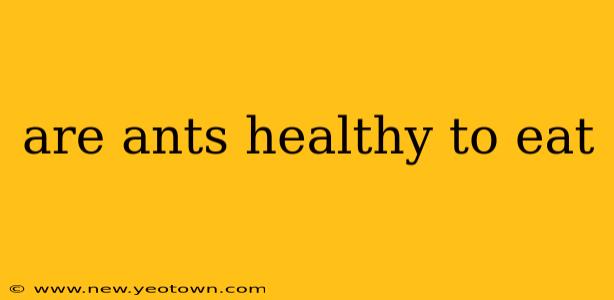Are Ants Healthy to Eat? A Surprisingly Delicious Deep Dive
The question, "Are ants healthy to eat?" might sound bizarre, even off-putting, to many. But before you wrinkle your nose, let's embark on a culinary adventure into the surprisingly nutritious world of insect consumption, specifically focusing on ants. For centuries, cultures across the globe have incorporated ants into their diets, viewing them not just as a source of protein but as a delicacy. So, are ants a healthy addition to your meal plan? Let's find out.
What are the Nutritional Benefits of Eating Ants?
Ants, like many insects, boast a remarkably high protein content. Think of them as tiny, crawling powerhouses! A serving of ants can provide a significant amount of essential amino acids, the building blocks of protein crucial for muscle growth, repair, and overall bodily functions. But protein isn't their only nutritional advantage. Depending on the species and their diet, ants can be a good source of healthy fats, fiber, and various micronutrients like iron, zinc, and even certain vitamins. Some ant species are even richer in certain nutrients than others. For example, certain leafcutter ant species are known to contain higher levels of iron.
Are all Ants Safe to Eat?
This is crucial. Not all ants are created equal, and not all ants are safe for consumption. Some ant species possess venomous stings or bites that can cause allergic reactions, ranging from mild discomfort to severe medical emergencies. Therefore, identifying the species correctly is paramount. Only consume ants that you have positively identified as edible and safe. This requires a solid understanding of entomology, or consulting with experts familiar with edible insect species in your region.
What Do Ants Taste Like?
The taste of ants varies greatly depending on the species, their diet, and how they are prepared. Some describe the flavor as subtly lemony or citrusy, while others report a nutty or earthy taste. The size of the ant also impacts the taste experience; larger ants, like the honeypot ant, offer a more intense, often sweeter flavor profile due to their honey-filled abdomens. Preparation methods also play a significant role in the final taste. Roasting, frying, or even incorporating them into sauces can all influence the overall flavor.
Are There Any Risks Associated with Eating Ants?
While generally safe when consumed correctly, there are some potential risks. The most significant risk, as previously mentioned, is consuming an ant species that is poisonous or venomous. Another concern is the potential for contamination. Ants forage in various environments and might ingest harmful substances, so it's essential to collect them from clean, uncontaminated areas. Finally, some individuals might experience allergic reactions, even to edible ant species. It's always advisable to start with a small quantity to assess any potential allergic response.
Where Can I Find Edible Ants?
Finding edible ants requires careful research and a keen eye. Consult with local experts or entomologists who can identify safe and edible species in your area. There are also specialized farms that cultivate edible insects, including ants, for consumption, offering a more controlled and safe source. Always prioritize safety and proper identification before consuming any wild-harvested ants.
How Should I Prepare Edible Ants?
Preparation methods for ants vary widely depending on the species and personal preference. Roasting ants brings out their natural flavors and creates a crunchy texture. Frying them can add a crispy exterior, while incorporating them into sauces or salsas adds a unique flavor element to dishes. Honeypot ants, with their sweet abdomens, can be enjoyed whole, offering a unique culinary experience.
In conclusion, while the idea of eating ants might seem unusual to many, their nutritional value and unique flavor profile make them a potentially healthy and interesting addition to a varied diet. However, exercising caution and prioritizing safety by accurately identifying edible species and practicing proper harvesting and preparation methods is absolutely critical. Remember, responsible foraging and consumption are key to enjoying this unique culinary experience safely.

